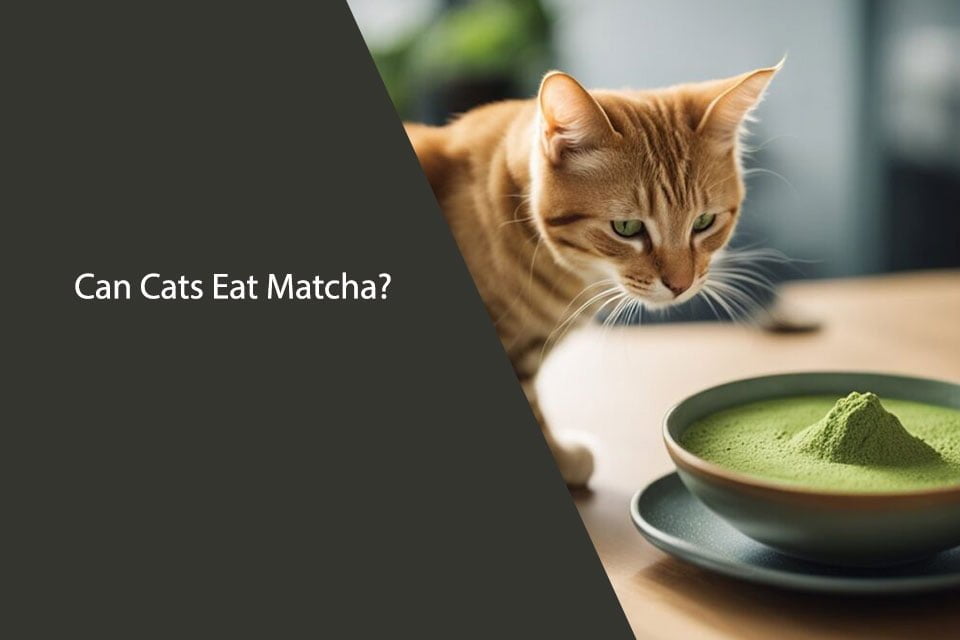Cats are curious creatures that love to explore their surroundings and try new things. As pet owners, it’s our responsibility to ensure that our furry friends are getting the right kind of nutrition and are not consuming anything that could be harmful to their health. With the increasing popularity of matcha, a type of green tea powder, many cat owners are wondering if it’s safe to share this trendy drink with their feline companions.
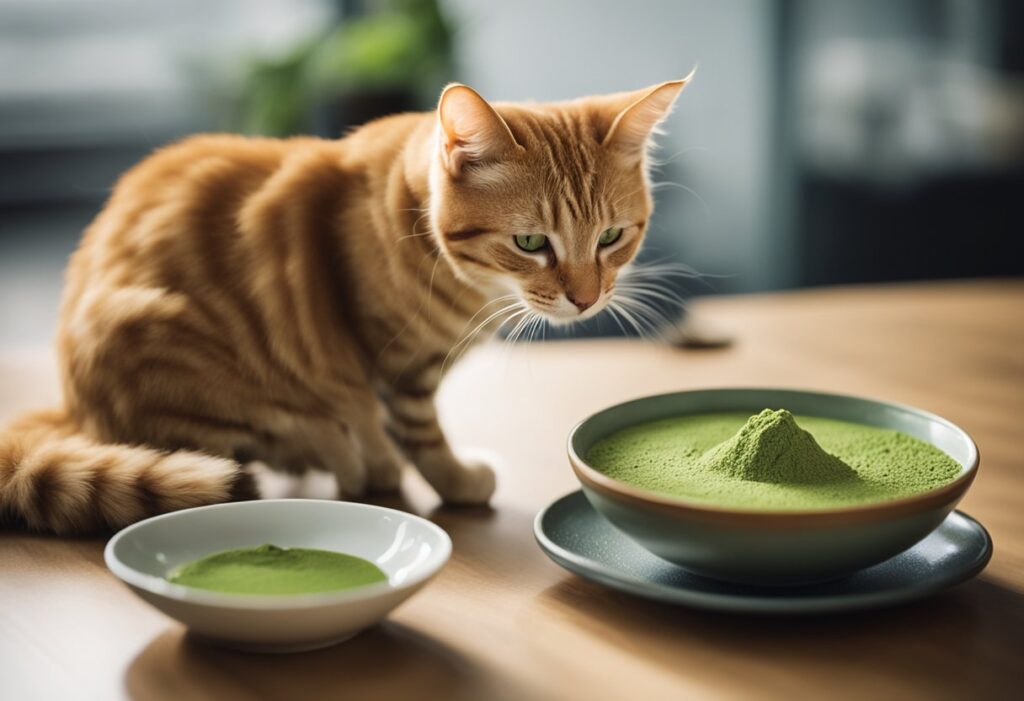
First and foremost, it’s important to understand what matcha is and how it differs from regular green tea. Matcha is made from shade-grown tea leaves that are ground into a fine powder, whereas regular green tea is made by steeping tea leaves in hot water. Matcha is known for its high concentration of antioxidants and other beneficial compounds, making it a popular choice among health-conscious individuals. However, when it comes to cats, it’s important to consider their unique dietary needs and whether or not matcha is a safe addition to their diet.
So, can cats eat matcha? The short answer is no, cats should not consume matcha or any other type of tea. While matcha may have health benefits for humans, it can be harmful to cats due to its caffeine content. Caffeine is a stimulant that can cause a range of adverse effects in cats, including restlessness, rapid breathing, heart palpitations, and even seizures. In addition, matcha may contain other ingredients, such as sugar or milk, that are not suitable for cats and could lead to digestive issues.
Table of Contents
What Is Matcha?

Matcha is a type of powdered green tea that originated in Japan. It is made by grinding green tea leaves into a fine powder, which is then whisked with hot water to create a frothy, bright green beverage. Matcha has gained popularity in recent years due to its unique flavor and reported health benefits.
Origin and Composition
Matcha has been a part of Japanese tea ceremonies for centuries and is highly regarded for its quality and taste. The tea leaves used to make matcha are grown in the shade, which increases their chlorophyll content and gives them a vibrant green color. The leaves are then harvested, steamed, and dried before being ground into a fine powder.
Matcha contains caffeine and the amino acid L-theanine, which work together to provide a sustained energy boost without the jitters or crash often associated with coffee. It also contains antioxidants called catechins, which are believed to have numerous health benefits.
Nutritional Profile
Matcha is a good source of vitamins and minerals, including vitamin C, potassium, and iron. It is also high in antioxidants, which can help protect against cell damage and reduce the risk of chronic diseases.
One serving of matcha (about 1 teaspoon of powder) contains approximately 35 milligrams of caffeine, which is roughly equivalent to a cup of coffee. It also contains about 1 gram of fiber and 3 grams of protein.
Overall, matcha is a healthy and flavorful beverage that can be enjoyed in a variety of ways. However, it is important to note that matcha may not be suitable for everyone, particularly those who are sensitive to caffeine or have certain medical conditions. As with any food or beverage, it is best to consume matcha in moderation and consult with a healthcare provider if you have any concerns.
General Feline Diet
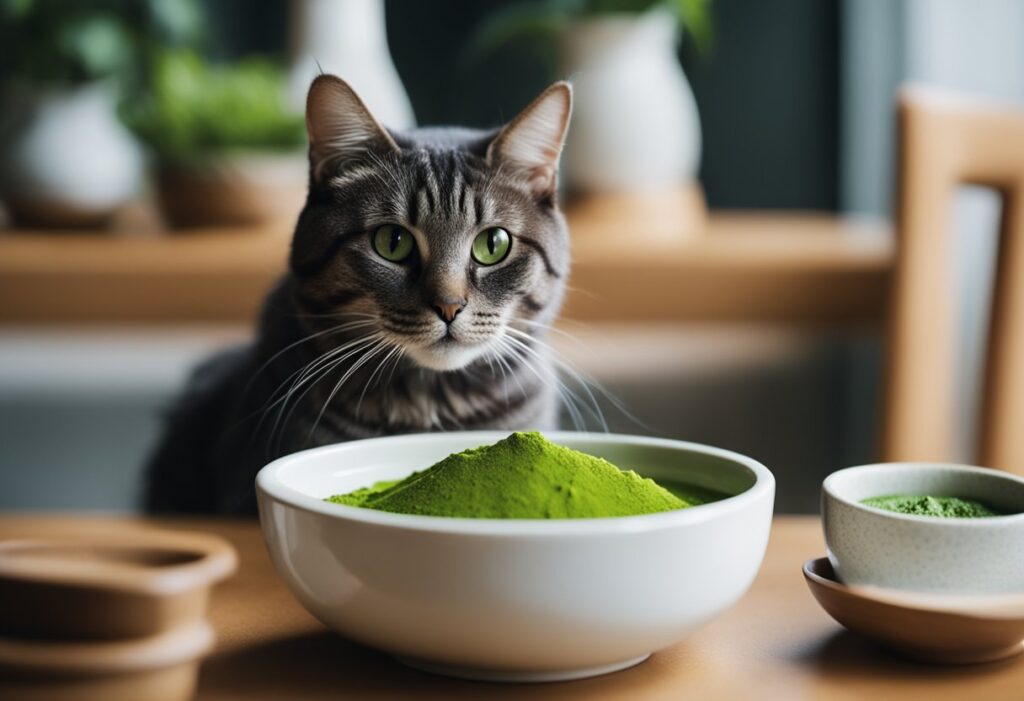
As pet owners, it is our responsibility to ensure that our cats have a healthy and balanced diet. A balanced diet is key to maintaining good health and preventing illnesses. The following are some general guidelines for feeding cats:
Protein
Cats are obligate carnivores, which means they require a diet high in protein. Protein is essential for maintaining muscle mass, healthy skin, and a shiny coat. Good sources of protein for cats include meat, fish, and poultry.
Carbohydrates
Cats do not require carbohydrates in their diet, but some commercial cat foods may contain them as fillers. It is important to ensure that the carbohydrate content of your cat’s food is not too high, as this can lead to obesity and other health problems.
Fats
Fats are an important part of a cat’s diet, providing energy and helping to maintain healthy skin and coat. Good sources of fat for cats include fish oil and chicken fat.
Vitamins and Minerals
Cats require a range of vitamins and minerals to maintain good health. These include vitamins A, D, E, and K, as well as calcium, phosphorus, and magnesium. Many commercial cat foods are fortified with these nutrients, but it is important to check the label to ensure that your cat’s food contains them.
In conclusion, a balanced diet is essential for maintaining good health in cats. As obligate carnivores, cats require a diet high in protein, and it is important to ensure that their food contains all the necessary vitamins and minerals.
Can Cats Eat Matcha?
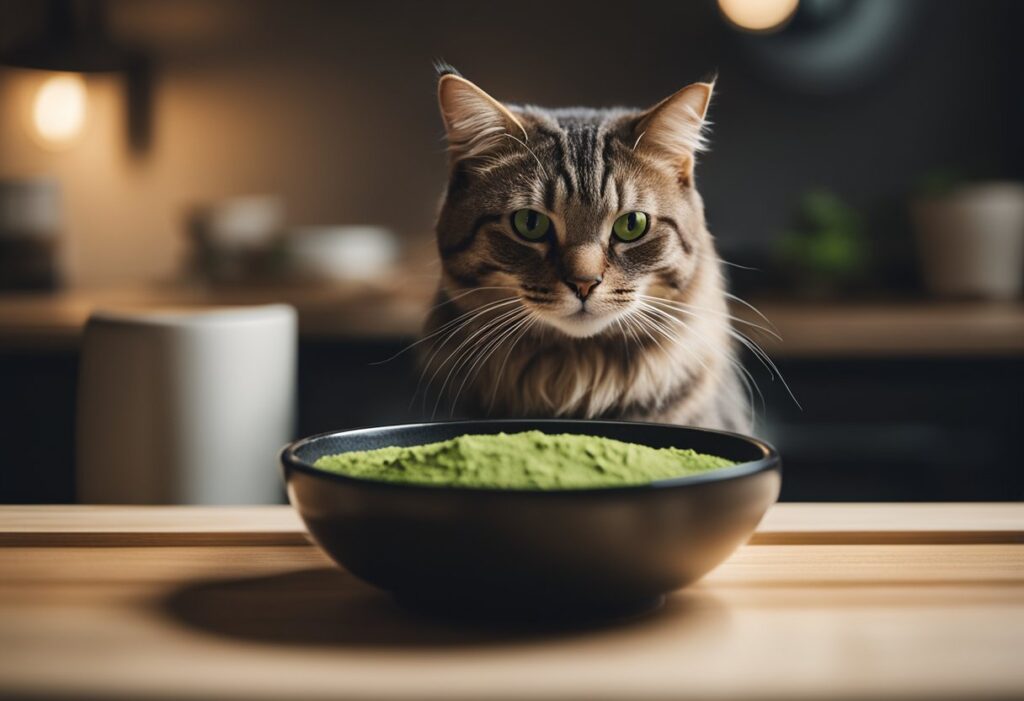
As cat owners, we always want to ensure that our feline friends are eating a healthy and balanced diet. With the increasing popularity of matcha, you may be wondering if it’s safe for your cat to consume. In this section, we will explore the potential health benefits and possible risks of cats consuming matcha.
Potential Health Benefits
Matcha is a type of green tea that is high in antioxidants, which can help boost the immune system and prevent cell damage. It also contains the amino acid L-theanine, which has been shown to reduce stress and anxiety in humans. While there is limited research on the effects of matcha on cats, it’s possible that these same benefits could apply to them as well.
Possible Risks
While matcha may have potential health benefits, it’s important to note that it also contains caffeine. Cats are sensitive to caffeine and consuming too much can lead to symptoms such as restlessness, rapid breathing, and heart palpitations. In severe cases, it can even be fatal. Additionally, matcha often contains added sugars or other additives that can be harmful to cats.
In conclusion, while matcha may have potential health benefits for cats, it’s important to exercise caution and moderation when feeding it to them. If you do decide to give your cat matcha, make sure it’s a small amount and free of any added sugars or other harmful additives. As always, it’s best to consult with your veterinarian before making any significant changes to your cat’s diet.
Can Cats Eat Matcha Ice Cream
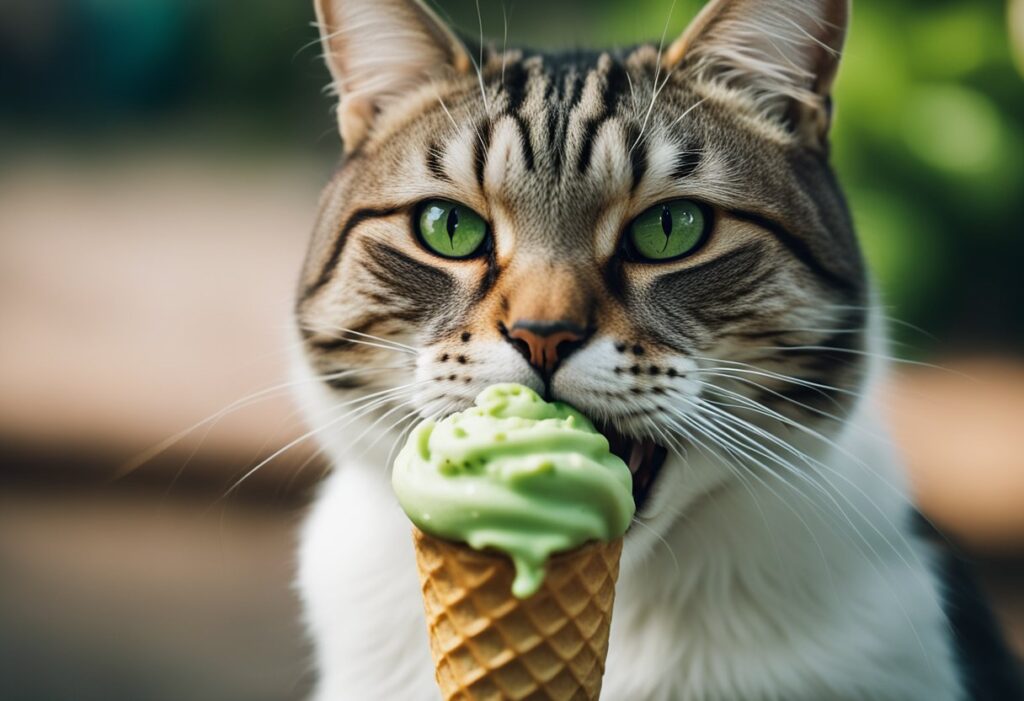
Matcha ice cream is a popular dessert that many humans enjoy. However, when it comes to cats, it is important to consider their dietary needs before feeding them any human food. In this section, we will explore whether or not cats can eat matcha ice cream.
First and foremost, it is important to note that matcha ice cream contains dairy, which can be difficult for cats to digest. Many cats are lactose intolerant, which means that consuming dairy products can lead to digestive issues such as diarrhea, vomiting, and abdominal pain.
In addition to the dairy content, matcha ice cream also contains sugar, which is not a necessary component of a cat’s diet. Cats are obligate carnivores, which means that they require a diet high in protein and low in carbohydrates. Feeding cats sugary treats can lead to weight gain, dental issues, and other health problems.
Overall, while cats may be curious about matcha ice cream, it is not a suitable food for them to consume. As responsible pet owners, it is important to provide cats with a balanced diet that meets their nutritional needs. If you want to treat your cat, there are many cat-friendly alternatives available that are both safe and nutritious.
Safe Foods for Cats
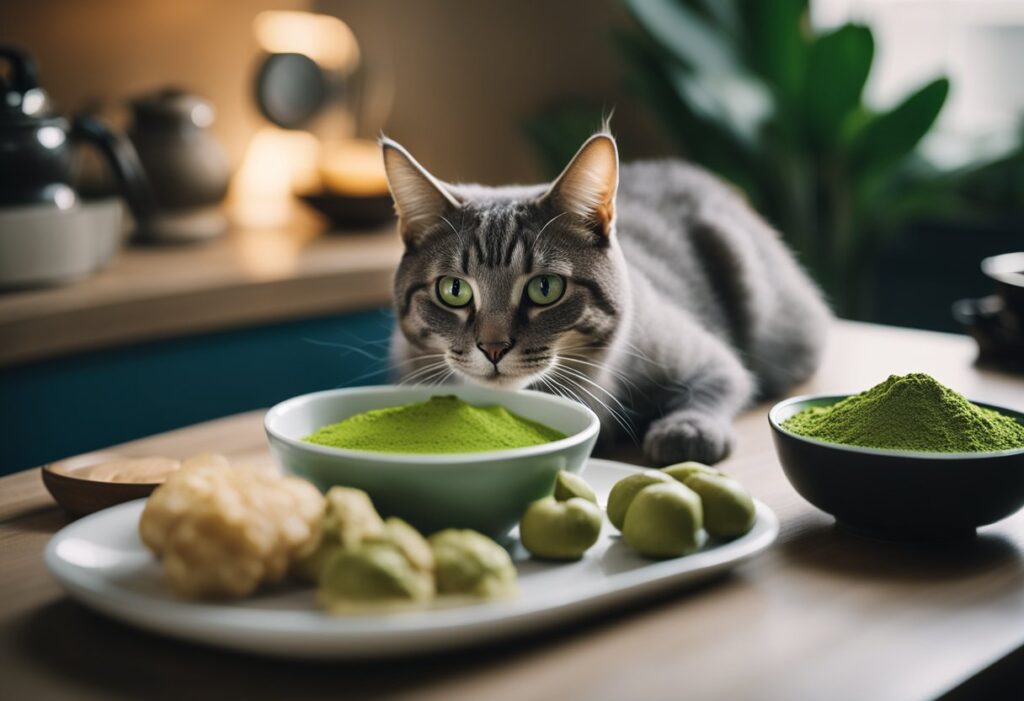
As responsible cat owners, we always want to make sure that our furry friends are getting the best nutrition possible. While it may be tempting to share some of our favorite human foods with our cats, it’s important to remember that not all foods are safe for them.
Here are some safe foods for cats that you can incorporate into their diet:
Protein:
Cats are obligate carnivores, which means that they require a diet high in protein. Some safe sources of protein for cats include:
- Cooked chicken or turkey (without bones or seasoning)
- Cooked fish (such as salmon or tuna)
- Cooked eggs (without seasoning)
Fruits and Vegetables:
While cats don’t require fruits and vegetables in their diet, they can be a healthy addition in moderation. Some safe options include:
- Cooked sweet potato or pumpkin
- Cooked green beans or peas
- Small amounts of chopped apple or banana (without seeds or skin)
Dairy:
While cats are lactose intolerant and should not consume cow’s milk, some dairy products can be safe for them in small amounts. Some options include:
- Plain yogurt (without added sugar or flavorings)
- Small amounts of cheese (such as cheddar or mozzarella)
It’s important to note that every cat is different and may have different dietary needs. Always consult with your veterinarian before making any changes to your cat’s diet.
Alternatives to Matcha for Cats
While matcha may have some potential health benefits for humans, it is not recommended for cats to consume. If you are looking for alternative ways to supplement your cat’s diet, there are a few options to consider.
Cat Grass
Cat grass is a safe and healthy alternative to matcha for cats. It is a type of grass that is safe for cats to eat and can provide them with essential nutrients. Cat grass is easy to grow and can be found at most pet stores or online. It is also a great way to keep your cat entertained and engaged.
Canned or Cooked Fish
Canned or cooked fish can be a great source of protein and omega-3 fatty acids for cats. However, it is important to make sure that the fish is cooked and does not contain any bones. Fish should also be given in moderation as it can lead to obesity and other health problems if given in excess.
Meat-based Treats
Meat-based treats are a great way to supplement your cat’s diet and provide them with essential nutrients. Look for treats that are made with high-quality meat and do not contain any fillers or artificial ingredients. It is important to give treats in moderation to avoid overfeeding and weight gain.
Overall, there are many safe and healthy alternatives to matcha for cats. By incorporating these options into your cat’s diet, you can help ensure that they are getting the nutrients they need to stay healthy and happy.
Frequently Asked Questions
What are the potential health risks of feeding matcha to cats?
Feeding matcha to cats can pose potential health risks, as matcha contains caffeine and other compounds that may not be suitable for cats. Additionally, matcha may contain additives or other ingredients that may be harmful to cats. It is important to consult with a veterinarian before feeding matcha or any other new food to your cat.
Can the caffeine in matcha be harmful to cats?
Yes, the caffeine in matcha can be harmful to cats. Cats are more sensitive to caffeine than humans, and even small amounts of caffeine can cause adverse effects such as restlessness, rapid breathing, heart palpitations, and even death. It is best to avoid feeding matcha or any other caffeinated products to cats.
Are there any non-toxic alternatives to matcha for cats?
Yes, there are non-toxic alternatives to matcha that are safe for cats to consume. Some examples include catnip, fresh cat grass, and cooked vegetables such as green beans or peas. However, it is important to introduce any new food to your cat slowly and in small amounts to avoid digestive upset.
How does matcha affect a cat’s digestive system?
Matcha can affect a cat’s digestive system by causing gastrointestinal upset, such as vomiting and diarrhea. Additionally, matcha may contain additives or other ingredients that may be harmful to cats. It is important to consult with a veterinarian before feeding matcha or any other new food to your cat.
What symptoms should I look for if my cat ingests matcha?
If your cat ingests matcha, you should look for symptoms such as restlessness, rapid breathing, heart palpitations, vomiting, diarrhea, and even seizures or death in severe cases. If you suspect that your cat has ingested matcha or any other toxic substance, seek veterinary care immediately.
Is there any safe amount of matcha for cats to consume?
There is no safe amount of matcha for cats to consume, as even small amounts of caffeine can be harmful to cats. It is best to avoid feeding matcha or any other caffeinated products to cats. If you are looking for a treat for your cat, consider non-toxic alternatives such as catnip or fresh cat grass.

